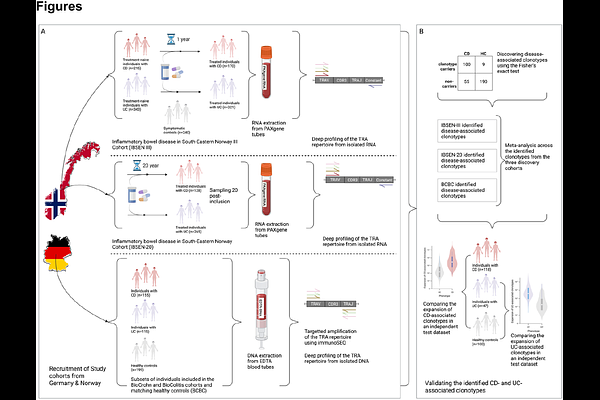Multi-centered T cell repertoire profiling identifies novel alterations in the immune repertoire of individuals with inflammatory bowel disease and validates previous findings

Multi-centered T cell repertoire profiling identifies novel alterations in the immune repertoire of individuals with inflammatory bowel disease and validates previous findings
Mahdy, A. K. H.; ElAbd, H.; Kokubun, E. E.; Kriukova, V.; Pesesky, M.; May, D. H.; Olbjorn, C.; Perminow, G.; Bengtson, M.-B.; Ricanek, P.; Andersen, S.; Detlie, T. E.; Kristensen, V. A.; Moum, B.; Vatn, M.; Bokemeyer, B.; Hov, J.; Halfvarsson, J.; Schreiber, S.; the IBSEN and IBSEN-III study group, ; Howie, B.; Robins, H. S.; Hoivik, M. L.; Franke, A.
AbstractIntroduction IBD is an incurable immune-mediated inflammatory disease (IMID), affecting the gut with a high rate of primary- and secondary- loss-of-response to therapy. By investigating the T cell receptor repertoire of individuals with IBD, novel therapeutic and preventive strategies can be identified, and a better understanding of IBD can be obtained. Methods Whereas most studies have so far focused on the more diverse T cell receptor beta (TRB) repertoire, we here profiled the alpha (TRA) repertoire of three cohorts containing treatment-naive and treated individuals in addition to individuals living with the disease for >20 years, resulting in an exhaustive dataset containing the TRA repertoire of 2,151 individuals. Results Using the generated datasets, we were able to replicate previous findings describing the expansion of Crohn\'s-associated invariant T (CAIT) cells in individuals with Crohn\'s disease (CD) in the three cohorts. Using a hypothesis-free statistical testing framework, we identified clonotypes that were associated with the disease at its different stages, e.g., at the time of diagnosis and decades post-diagnosis. By conducting a meta-analysis across the three cohorts, we were able to identify a set of clonotypes that were associated with the disease regardless of its stage. We validated our findings in a previously published independent test dataset from a German cohort, showing the robustness of the identified sets of clonotypes. Conclusion The identified clonotypes are potential novel therapeutic targets to treat IBD, e.g., through targeted depletion. These clonotypes are also of major interest as they can be investigated in a targeted fashion to identify culprit antigen(s) in IBD.